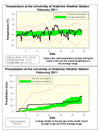There were lots of dramatic temperature swings during the month with 20+ degree differences between the high and lows for a day commonplace. Although the temperature danced above and below average, overall the month was 0.7 degrees colder. However it is still considered an average month for temperature as it was within the average range.
The first week of the month had lots of precipitation and then it was then pretty dry until some rain on the last day. However, even though the total precipitation was 63.4 mm compared to the average of 51.3 mm, it was still (just barely) within the average range.
For the year so far, the amount of precipitation that we have seen (118.3 mm) is very close to the average at this time (115.7 mm).
It really has been a back-end loaded winter this year for snow as between October 1st and January 31st we had 71 cm of snow, but in February alone we had 56 cm. This is close to double to average snow in February of 30.6 cm.
Summary for February 2011:
Maximum Temperature 9.3°C
Minimum Temperature -23.4°C
Average Daily High Temperature -2.1°C (Long term average -1.9°C)
Average Daily Low Temperature -11.7°C (Long term average -10.5°C)
Total Precipitation 63.4 mm (Long term average 51.3 mm)
(Long term averages based on 1971-2000 data for the Waterloo Wellington Airport)

Sign up to get the monthly weather station summary by e-mail




3 comments:
Thank you for the Feb. 2011 weather summary, which I thought was enjoyable and interesting. I was surprised Feb.'s temperatures were within the average range. Many times I have read in the Wat. Reg. Record newspaper or Weather Network on TV, that the normal daytime temperature for Feb. was about zero degrees C., and I looked at the current temperature in the afternoons, and it was about -5 to -7, which I thought was much colder than normal. Maybe normal is not a good word to use to describe the temperature. Maybe average temperature is the better way to describe it. I'm sure I read somewhere that about a month ago, K-W had so far received about 102 cm of snow. I thought it was written in one of the U of W weather station blogs, but I could not find it today. Maybe it was in the Record newspaper. Anyway, by now, I think K-W has received the normal or average amount of annual snowfall, which is 160 cm. Out of curiosity, I began watching the daily forecast high temperatures for Moscow, Russia, in The Record newspaper, since about Jan. 1, 2011, for something to do, because I noticed for many days in Jan. and about the first week of Feb, if I remember correctly, Kitchener-Waterloo and Moscow, were forecast to have about the same daytime high temperature. But since about Feb. 7, Moscow's forecast high and low temperatures have been quite a bit colder than K-W's. Both Canada and Russia are tied for title of coldest country in the world, as far as I'm concerned. Moscow is finally starting to warm up a bit, but Western Canada has often had very cold forecast temperatures, from Calgary, Edmonton, Regina, and Winnipeg. I hope K-W does not see much colder than normal temperatures, like those Western Canadian cities have seen. So much for global warming. I think the change to climate change , is a more accurate way to describe our changing weather.
A very weird month. It felt either really cold or really mild. Had more days above freezing than December and January (10 vs. 2 in January, and 6 in December if I remember correctly), but also, I think, more days colder than -20 °C...
I think I may have been too pessimistic, when I commented March 7, "so much for global warming", when I said I think we've had a long, cold, winter. I forgot that we are in a La Nina winter, which brings colder temperatures and more precipitation. So I was thinking, if we've got about the average annual amount of snow this winter from Oct. 2010 to today, and this is a La Nina winter, when we're supposed to get MORE snow, then maybe climate change and global warming may still be working after all. I guess La Nina and El Nino take precedence over climate change and global warming. I've never had much interest in La Nina and El Nino, because I think I've only heard about them for about the last 5-10 years, and they're not in the news very often.
Post a Comment